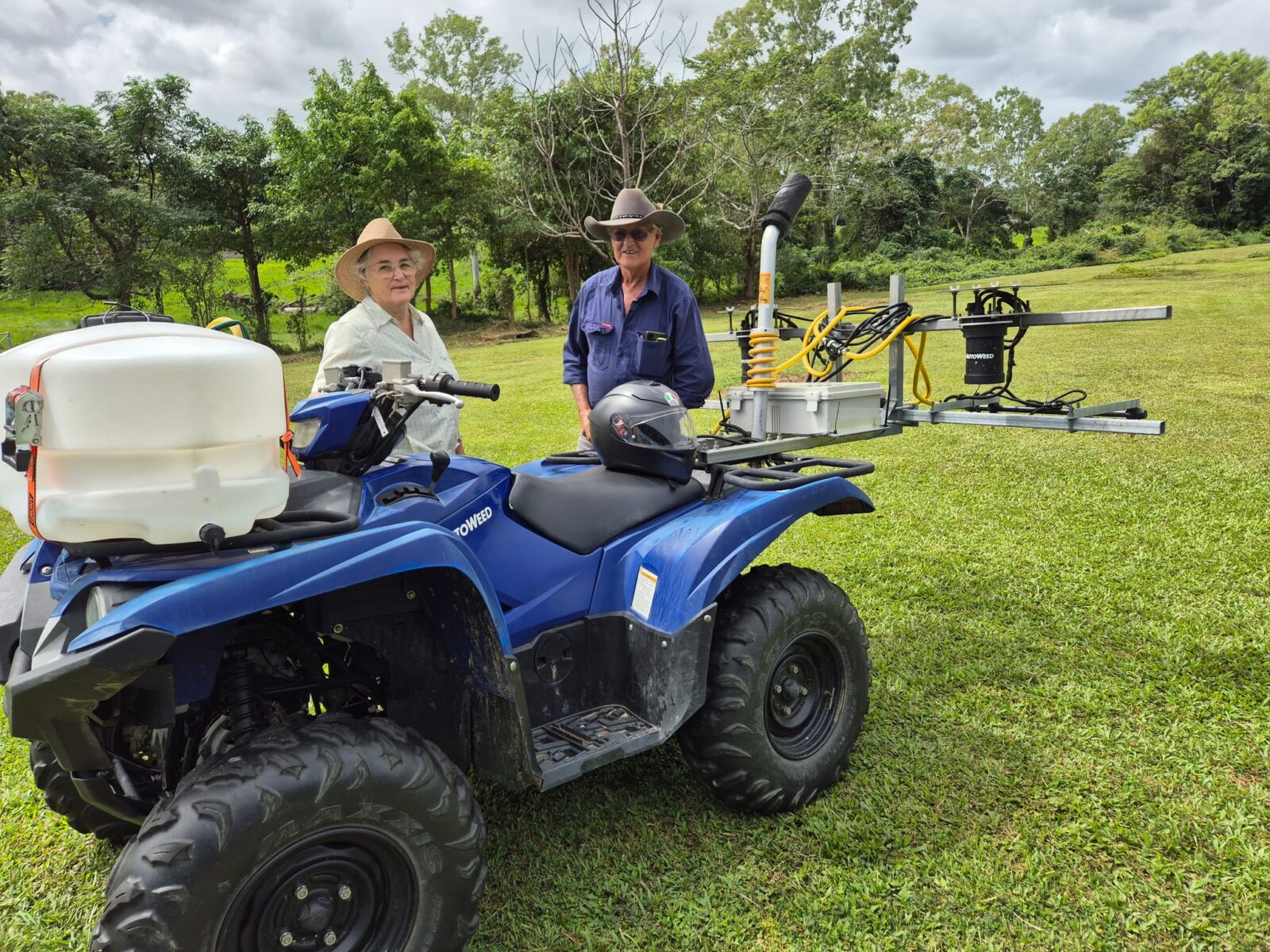Aussie-grown legumes in chicken meat diets could boost industry resilience and food security

 GLOBAL INNOVATION NETWORKS / Friday, 9 August 2024
GLOBAL INNOVATION NETWORKS / Friday, 9 August 2024 
There’s a lot to love about Cooktown; magnificent rainforests, ancient mangroves, reefs home to the legendary black marlin – but weeds aren’t one of them.
Cooktown beef producers Peter and Judy Irwin are one of many producers and growers on the tropical east coast of Queensland fighting the battle against sicklepod, an aggressive pasture invader. And in this remote part of Australia, they’re often doing it on limited resources. But a recent trial with InFarm has brought ground-breaking technology to the top of the country, showcasing the power of AI in weed detection and elimination.
Peter and Judy Irwin are true Cooktown locals. They’ve been producing beef cattle on their property at ‘Valley View’ for 40 years – the same amount of time Peter says sicklepod has been “smothering anything it can.”
A woody shrub, sicklepod can completely eradicate pasture growth and reduce carrying capacity by as much as 85%, leaving properties susceptible to becoming completely unproductive.
If left to grow in a sugar cane crop, sicklepod can have a significant effect on yield. Its woody nature also becomes a major issue when processing contaminated cane, causing machinery breakdowns at sugar mills.
Peter and Judy say there’s no measuring the countless hours and dollars they’ve spent spraying and handpicking the weed over the last four decades, so when the opportunity arose to be involved in trial using cutting-edge farming technology, the couple didn’t hesitate.
As part of the AgriFutures Australia Producer Technology Uptake Program (PTUP) for Building Drought Resilience, the team from InFarm spent a week on Valley View, putting its AI-based weed spraying tool to the test.
InFarm Managing Director Jerome Leray and Operations Manager, Dr Alex Olsen shared the technology and the trial results with local growers and landholders at the Cape York Weeds and Feral Animals Inc Innovation Field Day in Cooktown earlier this year, part of the PTUP program and facilitated through support from the Queensland Government’s Queensland Reef Water Quality Program.
Producers were also given the opportunity to see the technology in action, helping them stay ahead of the curve and access vital technologies and innovations changing the game in weed control and chemical runoff.
The Goondiwindi, Queensland based agricultural company uses AI technology to eliminate the need for expensive extra equipment and allows farmers to target weeds, saving up to 95% in herbicide use on farm.
With a sprayer fitted to an ATV at Judy and Peter’s property, the model was trained to detect only the weed of interest, completely sparing the grass. How? By taking thousands of images of the paddock and training the algorithm to recognise what’s a weed and what’s pasture. Swipe left for weeds, right for pasture.
The AI is trained to 94% accuracy, meaning every time it sees a weed image it has a 94% chance of correctly identifying it. It also collects 24 frames a second, giving it 24 chances to look at it. Collectively in the field, it results in a 99% hit rate.
The exercise took place over a one-acre trial, and while small in size, Jerome said the results were anything but.
“For that one-acre block, we only used 80 litres. Peter went and sprayed it with a boom spray and used 120 litres. So, it’s about 40 litres of savings there,” he said.
“If you had a paddock with less weed density, you get even better herbicide consumptions. Let’s say you drop that weed density down to 10% and let’s say the price of chemical doubles, which it seems like it is regularly, you could be saving up to $380 an acre for a single spray job – and that’s just one spray.
“If you are spraying three times a year, you start to really get those returns, not to mention the environmental benefit.”
For Judy and Peter, the trial undeniably impressed – from the technology’s accuracy to the smaller weeds it was able to target that would generally be missed when hand spraying, and the reduction in chemical waste from spray drift – but the fact it was in their part of the world left the greatest impact.
“We really appreciate the interest in agriculture, in and horticulture in our region, because it is kind of in the backwash here, and it’s very difficult accessing markets and being a part of the broader industry in Australia,” Judy explained.
“But our climate and our location, certainly our soils in the Endeavour Valley, offers a lot to anyone who wants to be into farming or horticulture, and I couldn’t encourage it enough.”
The couple is passionate about caring for their unique part of the country and commended the work of Trevor Meldrum, head of the Cape York Weeds and Feral Animals Inc, for not only initiating the trial, but for his tireless advocacy for the agricultural industry.
“Trevor’s passion for weeds management is just unmatched and we’ve been a supporter for many years,” Judy said.
The latest Cape York Peninsula trial might be done but it’s certainly not dusted, with InFarm setting its sights on the area.
Over the last four years it’s been working with sugar cane in the Burdekin region, hosting 11 strip replicated trials, measuring how well it killed weeds, the quantity of herbicide used, and the water quality runoff.
Sugar Research Australia found that chemical savings across all 11 trials came to 44%, and 96% weed knockdown – as effective as a blanket spray. The water quality benefit was also reflected in the runoff from the cane farms, attributing to less runoff to nearby reefs and lagoons.
The company is working to secure more funding to continue its work in the Cape York Peninsula to hold more trials on larger properties.
“You’ve got a weed paddock; we want to do a trial there and test the technology to work out what the savings are,” Jerome said.
“In that process we’ll be building AI models for weeds of interest in the Cape York region. It’s really exciting to see where this is going.”
Find out more about AgriFutures Australia’s Producer Technology Uptake Program, visit the Community of Practice here.
 CHICKEN MEAT / 09.08.24
CHICKEN MEAT / 09.08.24  NATIONAL CHALLENGES AND OPPORTUNITIES / 09.08.24
NATIONAL CHALLENGES AND OPPORTUNITIES / 09.08.24  INSECTS / 09.08.24
INSECTS / 09.08.24  CHICKEN MEAT / 09.08.24
CHICKEN MEAT / 09.08.24